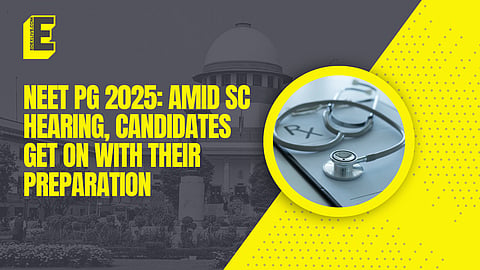
- News
- Campus
- Exam
- Podcast
- Web Stories
- Do You Know
- Path Finders - UG Programs
- Videos
- Élitscape

As the dates of the National Eligibility cum Entrance Test (NEET) Postgraduate (PG) approaches on June 15th, petitions demanding transparency, the release of question papers and answer keys have reached the Supreme Court — increasing anxiety among the aspirants.
Petitioners demand that the exams be conducted in one shift to maintain the standards of the question paper and make the normalisation process of the marks more transparent.
NEET-PG is one of the toughest examinations in the country, and hence petitioners feel that it is also essential to release answer keys to check them and rework their mistakes.
As the exam is just around the corner, let’s see what the NEET-PG aspirants have to say about the petitions and their preparation.
“NEET-PG exam should be conducted in one shift as there will be only one question paper equally distributed to everyone which requires no normalisation of marks,” says Yukta, a student from Visakhapatnam as she continues her preparation.
However, another respondent, Vardhan, deferred from this opinion as he went on to say, “Supreme Court has taken the right decision. As there is a huge competition for NEET-PG, the exam should be conducted in two shifts.”
NEET PG ranks are determined by two-step processes, ie, scoring and normalisation.
The exam includes 200 questions of 4 marks each with a negative marking of 1 mark for every wrong answer. The scoring process includes calculating the score of the individual where for each correct answer 4 marks are awarded and for each incorrect answer, 1 mark is deducted.
The next step is to convert these raw scores into percentiles. In the normalisation process, the highest scorer will automatically receive 100 percentile regardless of their raw score. The percentile represents the candidate's relative performance in comparison to other candidates. It constitutes the percentage of the candidates who scored at or below the other candidates' scores.
This includes converting the raw scores into a scale of 100 to 0 where the top-scoring candidate receives the 100 percentile.
When asked about this ranking procedure, Yukta opined that it would only be fair to calculate ranks based on percentile marks. On the other hand, Vardhan thinks that it is an unfair practice, as it shows the difference in ranks.
Yukta urges the government to conduct the exam at one particular time in the year and to schedule the counselling rounds as soon as the results are declared. She shares, “Being jobless for over 5 months past an exam is nothing but a waste of time and constant postponement of exams really affects the mental health of the candidates.”
Vardhan advises first-time or new NEET-PG aspirants to concentrate on practising MCQs and test series after they finish their main revision, as this exam determines their future after completing MBBS. Quite contradictory to Vardhan, Yukta says, “This is not everything,” suggesting that this exam solely does not determine everything in life.
On the whole, students have a mixed response about the exam shifts, normalisation and the exam's transparency. As the exam dates approach, the tension increases while the aspirants prepare and await the Supreme Court’s decision.
